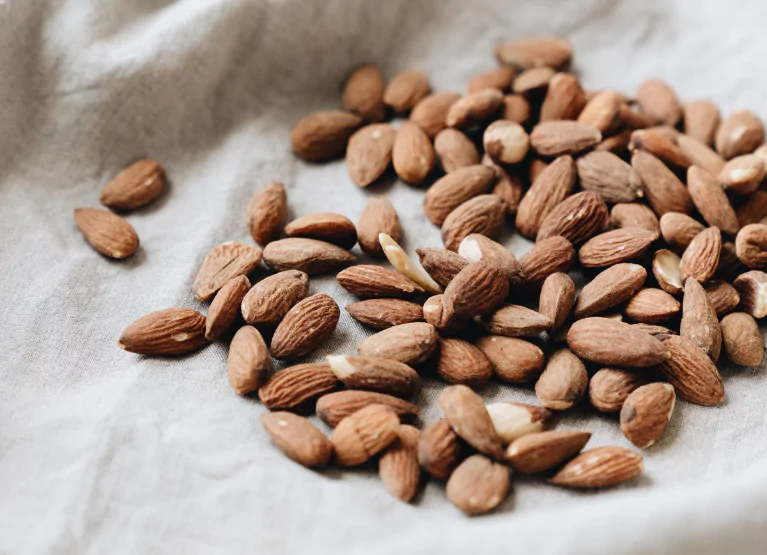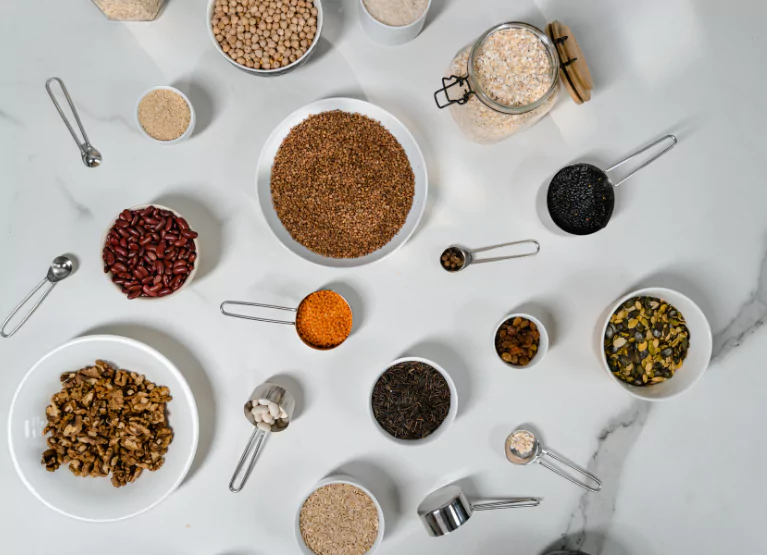Best and Worst Foods for Heart Health

Key Takeaways
When was the last time you considered how your heart was doing? If you think you should only focus on a heart-healthy lifestyle when your doctor tells you to, think again! According to the CDC, heart disease is the leading cause of death for men, women, and most ethnic groups in the United States. That's a scary statistic to read, but don't worry because there are several ways (other than just checking your blood pressure, which is a good practice, too) to prevent poor heart health.
Your heart is the primary organ of your circulatory system, and it's responsible for delivering oxygen to tissues like your muscles, controlling your heart rate, and maintaining blood pressure. It also contributes to energy, mental wellbeing, and metabolic health.
That’s why ensuring good heart health is vital for your overall wellbeing. And what better way to boost heart health than through nutrient-dense foods, which research has shown to be effective.
So, whether you’re looking to reduce your risk of developing heart disease or optimize cardiovascular function, we’ve rounded up foods with cardiovascular protective properties (along with foods that can harm heart health). Read on to find out what you should be adding to your diet and what you may want to consider limiting.
6 Best Heart-Healthy Foods
From fruits and vegetables to healthy beverages, here are foods that will benefit your cardiovascular health in the long term. Add these foods to your daily meals and consume them consistently to get the benefits. You can also discuss them with your nutritionist to determine how they fit in with your overall diet and other health goals.
1) Olive Oil

Olive oil is an excellent source of many nutrients, such as omega-9 and polyphenols (a type of antioxidant). This oil reduces inflammation by reducing the levels of inflammatory markers, a benefit that has been documented in many studies.
Inflammation can cause cardiovascular disease. It's because inflammatory molecules can signal a cascade that leads to plaque build-up and increased risk of CVD.
The consumption of extra virgin olive oil has been shown to stop this harmful process. And in doing so, it reduces the incidence of cardiovascular disease, heart failure, atrial fibrillation (irregular heartbeat), and mortality.
Another study showed that the polyphenols in olive oil could reduce blood pressure and improve the functioning of heart tissue called the endothelium in women with normal to high blood pressure or stage 1 essential hypertension.
2) Cruciferous Vegetables

Cruciferous vegetables are a group of vegetables from the Brassicaceae or Cruciferae (”cross-bearing”) family. This group gets its name from the flowers that the vegetables grow on, which have a cross on their petals.
The most commonly known cruciferous vegetables include:
- Broccoli
- Cauliflower
- Brussel sprouts
- Bok choy
- Cabbage
- Arugula
A study done on 1000 Chinese women showed that consuming cruciferous vegetables can also reduce inflammation. In this study, the authors found eating more of these vegetables was associated with lowered levels of inflammatory molecules and decreased oxidative stress.
By reducing inflammation and oxidative stress, cruciferous vegetables can benefit heart health and reduce the risk of developing cardiovascular disease.
3) Nuts

The consumption of nuts, especially peanuts and walnuts, can improve heart health in a variety of ways, including:
- Reducing the risk of heart disease like heart attacks
- Lowering levels of LDL (also known as the bad cholesterol)
- Reducing the risk of hypertension
- Reducing the risk of type 2 diabetes
- Healthy weight loss
- Improved hyperglycemia and insulin resistance (high glucose levels can be damaging to blood vessels)
- Reduced inflammation and oxidative stress
Nuts like walnuts are a rich source of omega-3 fatty acids, which give this food their cardiovascular protective benefits.
According to the American Heart Association, omega 3s boost heart health by improving blood lipid, or blood fat, levels like triglycerides and reducing plaque build-up. Omega 3s also have antioxidant properties that reduce inflammation and support cardiovascular function.
4) Fermented Drinks

It may seem controversial, but some high-quality fermented drinks, in moderation, can improve heart health. High-quality wine is an example of a fermented drink that may benefit cardiovascular health. These benefits are due to the phenolic antioxidant compounds that are in wine.
Wine (and phenolic compounds derived from wine) benefit heart health in a variety of ways:
- Reduce oxidative stress and inflammation
- Lower LDL levels
- Increase HDL levels (also known as the good cholesterol)
- Promote healthy blood clot formation
However, the Nutrisense Nutrition Team recommends limiting alcohol to three drinks (or even less for some people) since it affects the GI tract motility, absorption, and permeability. And when drinking wine in moderation, it’s best to opt for organic options or options low in toxins. You can test various options to find one that tastes good to you!
5) Coffee
Yes, your morning caffeine fix does play a role in improving heart health! Research has found that coffee consumption is linked to a lowered risk of heart failure.
The American College of Cardiology states that drinking two to three cups of this caffeinated beverage can is best to reduce the risk of heart disease and abnormal heart rhythms.
However, this will look different for everyone. If you find your blood sugar or overall health is affected by having too much coffee, don’t force it. Drinking a couple of cups a day or opting for lowered caffeine beverages like green tea can also benefit your heart.
6) Whole Grains

While every type of grain won‘t be as beneficial to heart health as the other foods on this list, they’re difficult to avoid altogether. Some of them can serve as good carbohydrate options if carbohydrates are a part of your current diet.
According to the American Heart Association, when it comes to grains, it’s essential to focus on whole-grain options. Whole grains are a good source of fiber. Fiber may benefit heart health by improving cholesterol levels and reducing the risk of stroke, heart disease, and type 2 diabetes.
5 Worst Foods for Heart Health
Along with knowing heart-healthy foods, it’s also important to know what’s not heart-healthy. You’ll want to avoid making these foods a regular part of your diet.
Some of these foods may be better for you than others; it depends on your unique body. Your dietitian can guide you on which foods you can work into a balanced diet and which are better to avoid altogether.
1) Trans Fats and Saturated Fats

Healthy fats are an essential part of a balanced diet. Examples of these fats include omega-3 fatty acids and omega-9 fatty acids. However, some fats are not so heart-healthy.
And these include trans fats that are in processed vegetable oils such as canola.
As for saturated fats, research on whether they can harm heart health is limited but does suggest too much of it is not ideal, especially if your diet consists of eating large amounts of refined carbohydrates (more on that below!).
2) Refined Carbohydrates
While whole grains can be beneficial for heart health, refined grains, or refined carbohydrates of any kind (think fried foods or even processed cereals), have the opposite effect. It's especially true for refined carb sources such as corn syrup.
These kinds of carbohydrates are lower in fiber, meaning they usually result in glucose spikes or hyperglycemia (a contributor to poor cardiovascular health).
Alluding to the effect of saturated fats and refined carbohydrates above, one study found that replacing saturated fats with high glycemic index carbohydrates increases the risk of myocardial infarction (MI) by 33 percent.
Similarly, increasing the glycemic load increases not only the risk of MI but also the risk of developing coronary heart disease.
That’s why it’s best to reduce how much-refined carbohydrates you have on special occasions (or eliminate them if that‘s what works for you). Try replacing refined carbs such as white pasta and bread with whole grains such as quinoa. Another option is to lower your carb consumption if a high (or moderate) carb diet doesn‘t work for you.
4) Sugary Beverages

Here’s a shocking statistic: sugary beverages make up 50% of the amount of added sugars consumed in the American diet. Drinking beverages with high amounts of added sugars, such as soda, is strongly associated with hypertension and type 2 diabetes.
Again, with type 2 diabetes, we see hyperglycemia or high blood glucose levels (especially if left unmanaged or not appropriately treated). And high levels of blood glucose can damage blood vessels.
It seems that the risk between poor heart health and sugar-sweetened beverages is dependent on how much of it people consume. Even a one-serving increase in these drinks can increase the risk of developing coronary heart disease (CHD), hypertension, and stroke.
There’s also a strong association between consuming highly sugary drinks and obesity. It seems that it’s best to limit how many of these drinks you have to the occasional consumption.
That may be once a week or once a month, depending on your overall lifestyle and habits. This is something else to consider discussing with your dietitian, as they will be familiar with your unique needs and lifestyle.
5) Processed Meat
The research on the consumption of processed meat and heart health is a little mixed. One study supports the idea that processed meat, mainly processed red meat, increases the risk of coronary heart disease and type 2 diabetes. But it doesn’t have a significant effect on strokes.
In later studies, consumption of processed red meats, such as hot dogs and deli meats, was associated with stroke, cardiovascular disease, and coronary heart disease.
One reason for this may be the cholesterol, iron, and saturated fat content.
Additionally, red meats are typically charred or barbecued, which increases molecules called heterocyclic amines that are associated with poor heart health.
Additional Lifestyle Habits For Good Cardiovascular Health

Along with focusing on a heart-healthy diet, there are additional lifestyle tips that will also improve cardiovascular health:
- Aerobic or cardio training or overall moving your body more.
- Getting enough good quality sleep.
- Reduce or eliminate nicotine consumption.
Find the right Nutrisense programto turn insight into progress.
Go Beyond Glucose Data with Nutrisense
Your glucose can significantly impact how your body feels and functions. That’s why stable levels are an important factor in supporting overall wellbeing. But viewing glucose isn't enough. Nutrisense, you’ll be able to learn how to use your body's data to make informed lifestyle choices that support healthy living.
One-to-one coaching
Sign up to access insurance-covered video calls to work with a glucose expert: a personal registered dietitian or certified nutritionist who will help tailor your lifestyle and diet to your goals.
Monitor and measure what matters
With the Nutrisense CGM Program, you can monitor your glucose with health tech like glucose biosensors and continuous glucose monitor (CGM)s, and analyze the trends over time with the Nutrisense App. This will help you make the most informed choices about the foods you consume and their impact on your health.
Find your best fit
Ready to take the first step? Start with our quiz to find the right Nutrisense program to help you take control.

Carlee's training at Western Illinois University and an internship at the Memphis VA Hospital lead her to a career in outpatient counseling and bariatric nutrition therapy. In these positions, Carlee realized many of the disease states (upwards of 80%!) her patients experienced were actually preventable. She knew she had to dig deeper into preventative health and has since been passionate about helping people translate this complex glucose data into actionable changes anyone can implement into their everyday lives.




